#fisa bill
Text

🇺🇸 🚨
UNITED STATES CONGRESS PASSES SERIES OF ANTI-DEMOCRATIC AND PRO-WAR BILLS DESPITE PUBLIC OPPOSITION
The United States Congress and Senate passed a series of bills, including three controversial anti-democratic and pro-war bills, two of which were tied together, on Saturday, bypassing public opinion and popular opposition to the profligate, pro-war, globalist, Neolib/Neocon agenda currently driving United States domestic and foreign policy.
Included in the bills passed was a bill to force TikTok to divest from its connections with China at risk of being banned immediately, which naturally was tied to a Foreign aid bill.
However, as even Republican Senator Rand Paul mentioned in an opinion piece in Reason Magazine, the Bill is almost certain to lead to more power for American political elites and their administrations to pressure companies like Apple and Google to further ban apps and sites that offer contradictory opinions to that of the invented narratives of the American Political class.
Before long, Americans, many of whom are already poorly informed, and heavily misinformed by their mainstream media, could lose access to critical information that contradicts the narratives of the United States government and corporate elites.
Horrifically, this only the start. The US Congress also extended the newly revised FISA spy laws, which gives the United States government the power to spy on the electronic communications of foreigners, while also conveniently sweeping up the conversations of millions of Americans, as we learned years ago thanks to the sacrifices of whistle blowers and journalists like Edward Snowden, Chelsea Manning and Julian Assange.
The new FISA Law goes further than this, however, granting US Intelligence agencies the power to spy on the wireless communications of Americans in completely new ways.
A recent Jacobin article describes these new powers as a, "radical expansion of government surveillance that would be ripe for abuse by a future authoritarian leader", or it could just be used by the authoritarian leadership we have right now, and have had for decades.
In fact, when one commentator described the new powers as "Stasi-like," Edward Snowden himself replied with a long post in which he remarked, "invocation of "Stasi-like" is not only a fair characterization of Himes' amendment, it's probably generous. The Stasi dared not even dream of what the Himes amendment provides."
The amendment in question just "tweaks" the current law's definition of an "electronic communication provider," which is being changed to "any service provider," something extremely likely to be abused by the government to force anyone with a business, a modem and people using their broadband to collect the electronic communications of those people, while also forcing their victims into silence.
The government could essentially force Americans to spy on other people and remain silent about it. Cafe's, restaurants, hotels, business landlords, shared workspaces all could get swept up into the investigations of the Intelligence agencies.
Worse still, because picking out the communications of a single user would be next to impossible, all of their victim's data would end up being surrendered to the authorities.
Sadly, the assault on Americans by their own political elites didn't end there, to top this historic day in Congress, at time when the United States public debt is growing at an astounding rate of $1 trillion every 100 days, US lawmakers also passed a series of pro-war aid packages to American allies (vassals) totalling some $95 billion.
Included in the foreign aid bill are aid packages totalling $61 billion for the Ukraine scam, $26 billion for Israel's special genocide operation in the Gaza Strip, and $8 billion to the Indo-Pacific to provoke WWIII with China, at the same time we're also provoking a nuclear holocaust with the Russian Federation.
Also buried in these aid packages is the authorization for the United States government to outright steal the oversees investments of the Russian Federation, and thereby the Russian taxpayers.
Astonishingly, and in direct opposition to the wishes of their own voters, Republican support was won without the possibility of conditioning the aid to any kind of border security, this despite the issue being among the top biggest concerns of Republican voters.
Although much of the money is to be used replenishing the heavily depleted stocks of America's weapons and munitions, it remains unclear where the munitions are expected to come from, as US defense production has remained sluggish and slow to expand despite heavy investments and demand in recent years, despite the rapid urgency with which the policy elite describe the situation.
It bodes poorly for working Americans that only a relatively small handful of lawmakers opposed the bills, producing unlikely bedfellows like Senator Bernie Sanders and Senator Mike Lee in the Senate, opposing the FISA bill.
While in the House, the loudest opposition to the foreign aid bill mostly came from populist Republicans such as Marjorie Taylor Greene, Thomas Massie and Paul Goser. Only 58 Congresmembers voted against the Foreign Aid Bill in which the TikTok ban was tucked.
Not one word from American politicians about the need to raise the minimum wage, which hasn't been increased since 2009 despite considerable inflation, nor a word about America's endlessly growing homelessness crises, property crime increases, or the 40-year stagnation of American wages, the deterioration of infrastructure, and precious little was said besides complaints about border security over the immigration crises sparked by American Imperialist adventures and US sanctions.
What we've learned today is that we are highly unlikely to see any changes to the insane behavior of the US and its allies any time soon, neither with regards to the absolutely bonkers Neocon foreign policy leading us to the edge of abyss, nor the spending-for-the-rich/austerity-for-the-poor Neoliberal domestic policy of the last 45 years.
#source1
#source2
#source3
#source4
#source5
#source6
#source7
#source8
@WorkerSolidarityNews
Blue: titles are opinion pieces or analysis, and may or may not contain sources.
#us news#us politics#us domestic policy#us economic policy#us economy#us foreign policy#us foreign aid#foreign aid#ukraine#ukraine war#russo ukrainian war#russia ukraine war#israel#palestine#china#politics#news#geopolitics#world news#global news#international news#war#breaking news#current events#us imperialism#immigration crisis#fisa#fisa court#fisa bill#tiktok ban
49 notes
·
View notes
Text
What Edward Snowden just said about the DEEP STATE should WAKE US UP
youtube
#NSA#congress#politics#privacy#internet#constitution#edward snowden#mike johnson#fisa#police state#big brother#propaganda#fbi#deep state#secret police#bill of rights#4th amendment#house of representatives#senate#domestic spying#Youtube
4 notes
·
View notes
Text
NOT congress ...the nwo/wef/un shills in the republican/democrat/uniparty
141 notes
·
View notes
Text
FISA 702 HAS PASSED THE HOUSED. WE MUST STOP IT!
Fax your legislators! TELL THEM YOU WON'T VOTE FOR THEM IF THEY VOTE YES ON FISA (Fy-zah) 702!
You can also fax your legislators for FREE at:
From Edward Snowden's Twitter:
If you were mad about your House rep voting to let the government spy on you without a warrant ("FISA 702" - fy-za seven-oh-two), we may have one last shot. CALL YOUR REP @ (202) 224-3121 and say "𝗜𝗳 𝘆𝗼𝘂 𝘃𝗼𝘁𝗲 𝗳𝗼𝗿 𝟳𝟬𝟮, 𝗜 𝘃𝗼𝘁𝗲 𝘁𝗼 𝗴𝗲𝘁 𝗿𝗶𝗱 𝗼𝗳 𝘆𝗼𝘂."
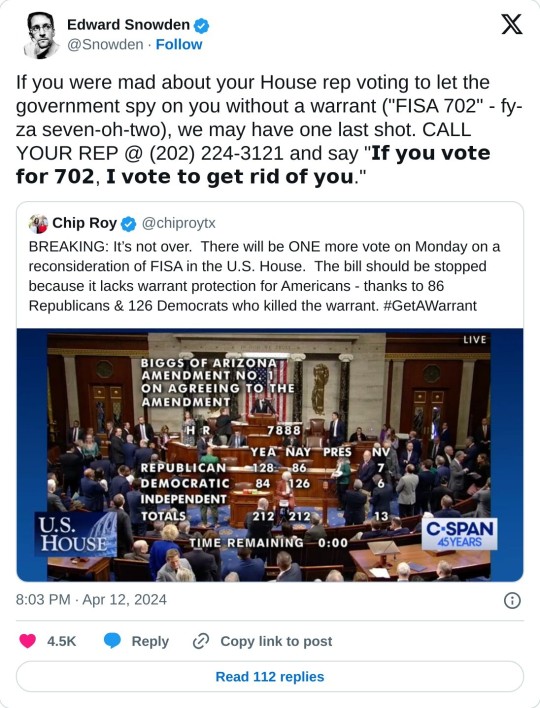
From the article link:
House lawmakers voted on Friday to reauthorize section 702 of the Foreign Intelligence Surveillance Act, or Fisa, including a key measure that allows for warrantless surveillance of Americans. The controversial law allows for far-reaching monitoring of foreign communications, but has also led to the collection of US citizens’ messages and phone calls.
Lawmakers voted 273–147 to approve the law, which the Biden administration has for years backed as an important counterterrorism tool. An amendment that would have required authorities seek a warrant failed, in a tied 212-212 vote across party lines.
Donald Trump opposed the reauthorization of the bill, posting to his Truth Social platform on Wednesday: “KILL FISA, IT WAS ILLEGALLY USED AGAINST ME, AND MANY OTHERS. THEY SPIED ON MY CAMPAIGN!!!”
The law, which gives the government expansive powers to view emails, calls and texts, has long been divisive and resulted in allegations from civil liberties groups that it violates privacy rights. House Republicans were split in the lead-up to vote over whether to reauthorize section 702, the most contentious aspect of the bill, with Mike Johnson, the House speaker, struggling to unify them around a revised version of the pre-existing law.
Republicans shot down a procedural vote on Wednesday that would have allowed Johnson to put the bill to a floor vote, in a further blow to the speaker’s ability to find compromise within his party. Following the defeat, the bill was changed from a five-year extension to a two-year extension of section 702 – an effort to appease far-right Republicans who believe Trump will be president by the time it expires.
Section 702 allows for government agencies such as the National Security Administration to collect data and monitor the communications of foreign citizens outside of US territory without the need for a warrant, with authorities touting it as a key tool in targeting cybercrime, international drug trafficking and terrorist plots. Since the collection of foreign data can also gather communications between people abroad and those in the US, however, the result of section 702 is that federal law enforcement can also monitor American citizens’ communications.
Section 702 has faced opposition before, but it became especially fraught in the past year after court documents revealed that the FBI had improperly used it almost 300,000 times – targeting racial justice protesters, January 6 suspects and others. That overreach emboldened resistance to the law, especially among far-right Republicans who view intelligence services like the FBI as their opponent.
Trump’s all-caps post further weakened Johnson’s position. Trump’s online remarks appeared to refer to an FBI investigation into a former campaign adviser of his, which was unrelated to section 702. Other far-right Republicans such as Matt Gaetz similarly vowed to derail the legislation, putting its passage in peril.
Meanwhile, the Ohio congressman Mike Turner, Republican chair of the House Intelligence Committee, told lawmakers on Friday that failing to reauthorize the bill would be a gift to China’s government spying programs, as well as Hamas and Hezbollah.
“We will be blind as they try to recruit people for terrorist attacks in the United States,” Turner said on Friday on the House floor.
The California Democratic representative and former speaker Nancy Pelosi also gave a statement in support of passing section 702 with its warrantless surveillance abilities intact, urging lawmakers to vote against an amendment that would weaken its reach.
“I don’t have the time right now, but if members want to know I’ll tell you how we could have been saved from 9/11 if we didn’t have to have the additional warrants,” Pelosi said.
Debate over Section 702 pitted Republicans who alleged that the law was a tool for spying on American citizens against others in the GOP who sided with intelligence officials and deemed it a necessary measure to stop foreign terrorist groups. One proposed amendment called for requiring authorities to secure a warrant before using section 702 to view US citizens’ communications, an idea that intelligence officials oppose as limiting their ability to act quickly. Another sticking point in the debate was whether law enforcement should be prohibited from buying information on American citizens from data broker firms, which amass and sell personal data on tens of millions of people, including phone numbers and email addresses.
Section 702 dates back to the George W Bush administration, which secretly ran warrantless wiretapping and surveillance programs in the aftermath of the 9/11 terror attacks. In 2008, Congress passed section 702 as part of the Fisa Amendments Act and put foreign surveillance under more formal government oversight. Lawmakers have renewed the law twice since, including in 2018 when they rejected an amendment that would have required authorities to get warrants for US citizens’ data.
Last year Merrick Garland, the attorney general, and Avril Haines, director of national intelligence, sent a letter to congressional leaders telling them to reauthorize section 702. They claimed that intelligence gained from it resulted in numerous plots against the US being foiled, and that it was partly responsible for facilitating the drone strike that killed the al-Qaida leader, Ayman al-Zawahiri, in 2022.
42 notes
·
View notes
Text
Guess who is exempt from the new FISA bill?
Guess who is exempt from insider trading crimes?
Guess who is exempt from Obamacare?
Guess who is exempt from vaccine mandates?
Guess who is exempt from FOIA?
The treasonous traitors that call themselves Congress.
25 notes
·
View notes
Text
Hey so remember how I posted yesterday about how it’s not a great idea to be condescending to people assuming the worst about the surveillance state and the role of the internet and tech companies in upholding and enforcing it? Well anyway, here’s an important thread on the House’s Section 702 “reform” bill, scheduled for a floor vote ASAP (as early as Dec. 12), which would be one of the largest expansions of surveillance within the US (accessible text below the images along with links to the linked articles)

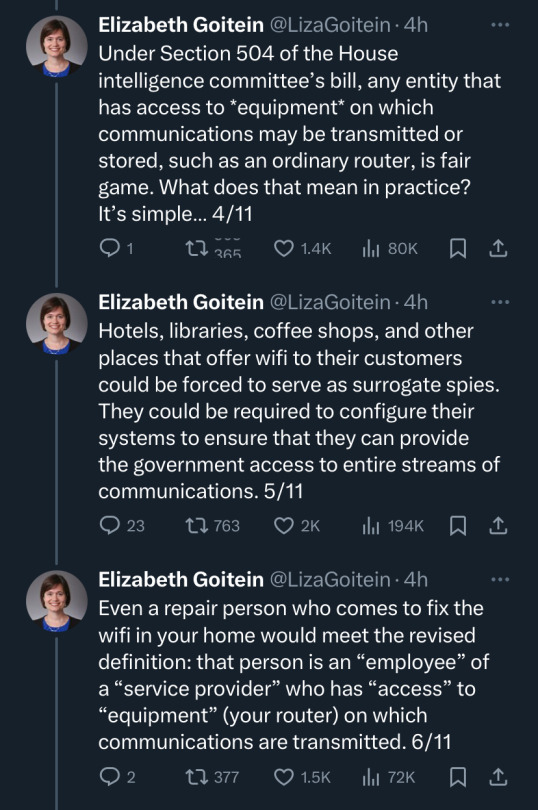
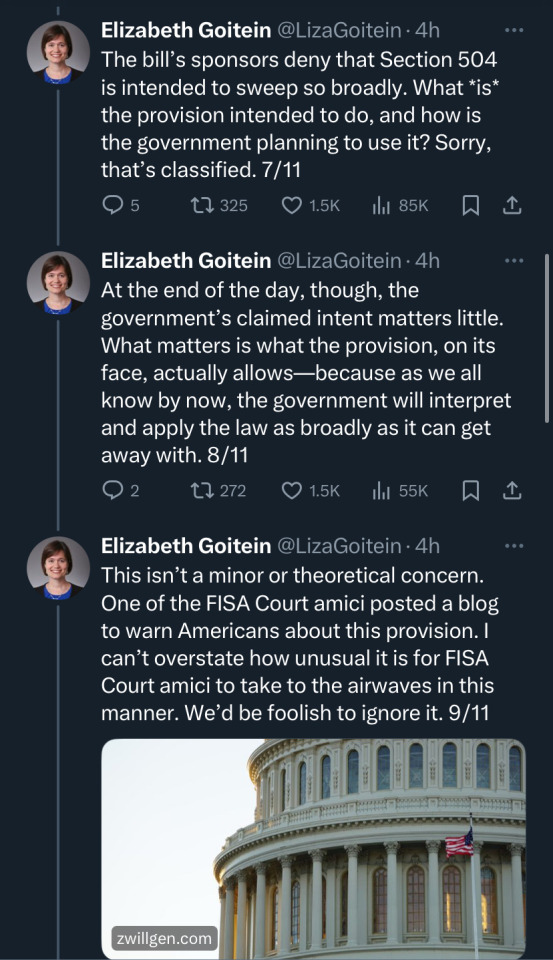
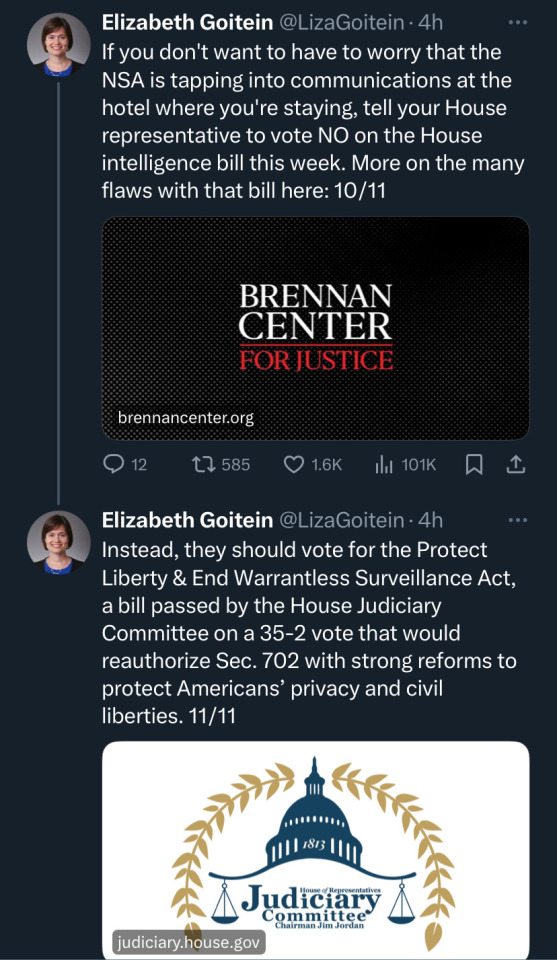
Tweet thread from Elizabeth Goitein:
RED ALERT: Buried in the House intelligence committee’s Section 702 “reform” bill, which is schedule for a floor vote as soon as tomorrow, is the biggest expansion of surveillance inside the United States since the Patriot Act. 1/11
Through a seemingly innocuous change to the definition of “electronic service communications provider,” the bill vastly expands the universe of U.S. businesses that can be conscripted to aid the government in conducting surveillance. 2/11
Under current law, the government can compel companies that have direct access to communications, such as phone, email, and text messaging service providers, to assist in Section 702 surveillance by turning over the communications of Section 702 targets. 3/11
Under Section 504 of the House intelligence committee’s bill, any entity that has access to *equipment* on which communications may be transmitted or stored, such as an ordinary router, is fair game. What does that mean in practice? It’s simple… 4/11
Hotels, libraries, coffee shops, and other places that offer wifi to their customers could be forced to serve as surrogate spies. They could be required to configure their systems to ensure that they can provide the government access to entire streams of communications. 5/11
Even a repair person who comes to fix the wifi in your home would meet the revised definition: that person is an “employee” of a “service provider” who has “access” to “equipment” (your router) on which communications are transmitted. 6/11
The bill’s sponsors deny that Section 504 is intended to sweep so broadly. What *is* the provision intended to do, and how is the government planning to use it? Sorry, that’s classified. 7/11
At the end of the day, though, the government’s claimed intent matters little. What matters is what the provision, on its face, actually allows—because as we all know by now, the government will interpret and apply the law as broadly as it can get away with. 8/11
This isn’t a minor or theoretical concern. One of the FISA Court amici posted a blog to warn Americans about this provision. I can’t overstate how unusual it is for FISA Court amici to take to the airwaves in this manner. We’d be foolish to ignore it. https://www.zwillgen.com/law-enforcement/fisa-reform-bill-702-surveillance/ 9/11
If you don't want to have to worry that the NSA is tapping into communications at the hotel where you're staying, tell your House representative to vote NO on the House intelligence bill this week. More on the many flaws with that bill here: https://t.co/i9PEXmg5r6 10/11
Instead, they should vote for the Protect Liberty & End Warrantless Surveillance Act, a bill passed by the House Judiciary Committee on a 35-2 vote that would reauthorize Sec. 702 with strong reforms to protect Americans’ privacy and civil liberties. https://t.co/CN7ZepGSUu 11/11
#us politics#surveillance state expansion#no such thing as too much caution when it comes to privacy in a state or free market that has no incentives to provide it 🙃
36 notes
·
View notes
Text
Last month, US president Joe Biden signed a surveillance bill enhancing the National Security Agency’s power to compel US businesses to wiretap communications going in and out of the country. The changes to the law have left legal experts largely in the dark as to the true limits of this new authority, chiefly when it comes to the types of companies that could be affected. The American Civil Liberties Union and organizations like it say the bill has rendered the statutory language governing the limits of a powerful wiretap tool overly vague, potentially subjecting large swaths of corporate America to warrantless and secretive surveillance practices.
In April, Congress rushed to extend the US intelligence system’s “crown jewel,” Section 702 of the Foreign Intelligence Surveillance Act (FISA). The spy program allows the NSA to wiretap calls and messages between Americans and foreigners abroad—so long as the foreigner is the individual being “targeted” and the intercept serves a significant “foreign intelligence” purpose. Since 2008, the program has been limited to a subset of businesses that the law calls “electronic communications service providers,” or ECSPs—corporations such as Microsoft and Google, which provide email services, and phone companies like Sprint and AT&T.
In recent years, the government has worked quietly to redefine what it means to be an ECSP in an attempt to extend the NSA’s reach, first unilaterally and now with Congress’ backing. The issue remains that the bill Biden signed last month contains murky language that attempts to redefine the scope of a critical surveillance program. In response, a coalition of digital rights organizations, including the Brennan Center for Justice to the Electronic Frontier Foundation, is pressing the US attorney general, Merrick Garland, and the nation’s top spy, Avril Haines, to declassify details about a relevant court case that could, they say, shed much-needed light on the situation.
In a letter to the top officials, more than 20 such organizations say they believe the new definition of an ECSP adopted by Congress might “permit the NSA to compel almost any US business to assist” the agency, noting that all companies today provide some sort of “service” and have access to equipment on which “communications” are stored.
“Deliberately writing overbroad surveillance authorities and trusting that future administrations will decide not to exploit them is a recipe for abuse,” the letter says. “And it is entirely unnecessary, as the administration can—and should—declassify the fact that the provision is intended to reach data centers.”
The Justice Department confirmed receipt of the letter on Tuesday but referred WIRED to the Office of the Director of National Intelligence, which has primary purview over declassification decisions. The ODNI has not responded to a request for comment.
It is widely believed—and has been reported—that data centers are the intended target of this textual change. Matt Olsen, the assistant US attorney general for national security, appeared on an April 17 episode of the Lawfare podcast to say that, while unable to confirm or deny any specifics, data centers today store a significant amount of communications data and are an “example” of why the government viewed the change as necessary.
A DOJ spokesperson pointed WIRED to an April 18 letter by Garland that claims the new ECSP definition is “narrowly tailored.” The letter includes written reflections on the provision by the assistant attorney general, Carlos Uriarte, who writes that the “fix” is meant to address a “critical intelligence gap” resulting from changes in technology over the past 15 years. According to Uriarte, the DOJ has committed to applying the new definition internally “to cover the type of service provider at issue” before the court.
Ostensibly this means the government is promising to limit future surveillance directives to data centers (in addition to the companies traditionally defined as ECSPs).
The surveillance court that oversees FISA and the appeals court that reviews its decisions sided two years ago with an unidentified company that fought back after being served an NSA order. Both courts ruled that it did not, in fact, appear to meet the criteria for being considered an ECSP, as only part of its function was storing communications data. Finding the government’s interpretation of the statute overly broad, the court reminded the government that only Congress has the “competence and constitutional authority” to rewrite the law.
Digital rights groups argue that declassifying additional information about this FISA case may help the public understand which types of businesses are actually subject to NSA directives. Practically speaking, they say, that information is no longer a secret anyway. “Declassifying this information would cause little if any national security harm,” the letter says. “The New York Times has already revealed that the relevant FISC case addressed data centers for cloud computing.”
In the aftermath of the FISA court’s ruling, the NSA and other spy agencies began lobbying the House and Senate intelligence committees to aid the administration in redefining what it means to be an ECSP. Members of both committees have subsequently portrayed the court’s ruling as a “directive” that Congress needs to expand the NSA’s reach. In a floor speech last month, Mark Warner, the chair of the Senate Intelligence Committee, said, “So what happened was, the FISA Court said to Congress: You guys need to close this loophole; you need to close this and change this definition.”
But in fact what the court asserted was that the government had exceeded its authority and that it was Congress’ job, not the Justice Department’s, to revise the law. “Any unintended gap in coverage revealed by our interpretation is, of course, open to reconsideration by the branches of government whose competence and constitutional authority extend to statutory revision,” the court said.
This would culminate in new language being proposed that quickly alarmed legal experts, including top civil liberties attorneys who’ve appeared before the secret court in the past. The surveillance fears quickly spread to Silicon Valley. The Information Technology Industry Council, one of the tech industry's top lobbying arms, warned that companies like Facebook and IBM were interpreting the bill as having “vastly expanded the US government’s warrantless surveillance capabilities.”
This expansion, the firm added, would also hinder the “competitiveness of US technology companies” and arguably imperil the “continued global free flow of data between the US and its allies.” Customers internationally, it argued, would likely begin taking their business elsewhere should the US government turn data centers into surveillance watering holes.
Concerns about the new ECSP definition have been circulating since December. While largely dismissing them, members of the House and Senate intelligence committees made a few adjustments in February, exempting a handful of business types. This came in response to popular concerns that Starbucks employees and hotel IT staff might be secretly conscripted by the NSA. FISA experts such as Marc Zwillinger—a private attorney who has appeared twice before the FISA Court of Review—noted in response to those adjustments that Congress’ rush to exempt a handful of businesses only served to demonstrate that the text was inherently too broad.
Intelligence committee members kept the pressure on lawmakers to reauthorize the Section 702 program with the sought-after language, going as far as to suggest that another 9/11-style attack might occur if they failed. The power of the committees was on full display, as while neither actually have primary jurisdiction over FISA, a majority of the Section 702 bill that passed was authored by intelligence committee staff.
Even while supporting the new framework and dismissing the intensity of civil society’s concerns, Warner did eventually step forward to acknowledge the new ECSF definition needed additional tweaking. First, on the Senate floor in April, he said that Garland shared his “view” that the language “could have been drafted better.” Later, in response to questions from reporters, he added: “I’m absolutely committed to getting that fixed.”
That appears unlikely to happen soon. According to The Record, Warner indicated that the best time to update the language again would be in the “next intelligence bill,” presumably referring to legislation this fall broadly reauthorizing the intelligence community’s work.
In the meantime, however, more than half of Congress is running for election, and the next US president will have greater surveillance powers than any other before. No one can say for sure who that president will be or how they’ll make use of that authority.
11 notes
·
View notes
Text
Hey! Please sign this petition against KOSA or Kids Online Safety Act. This bill will endanger children and teens instead of protecting them. It will grant state attorney generals too much power over the internet, and it will do more harm to the youth and the internet as a whole
The Hertiage Foundation has also openly stated they will use it to censor all queer and trans content
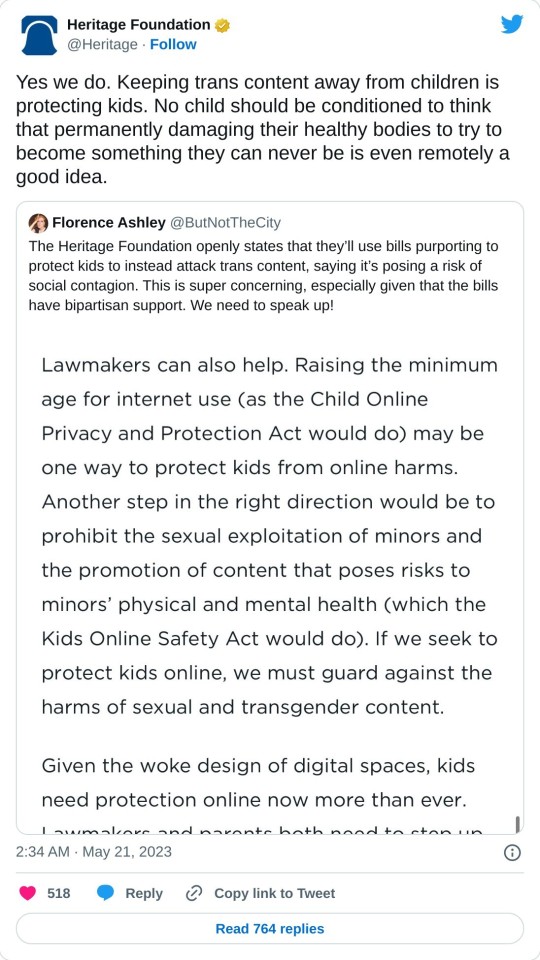
#internet censorship#internet privacy#stop kosa#kosa#kids online safety act#earn it act#lgbtq#lgbt#fuck the censors#data privacy#fuck online censors#online privacy#privacy is a human right#scotus#supreme court#us supreme court#lgbtq rights#transgender#queer rights#trans rights
62 notes
·
View notes
Text
This week, Congressional leaders are again trying to quietly and quickly get Congress to approve unconstitutional, warrantless mass surveillance.1
Rather than allowing debate on major privacy protections, some members are trying to jam an extension of a controversial warrantless surveillance power — Section 702 of the Foreign Intelligence Surveillance Act (FISA) — into a “must-pass” defense authorization bill.1
Section 702 has been abused in ways that violate Americans’ fundamental civil liberties and civil rights. FBI agents have used 702 to search through troves of warrantlessly acquired communications for conversations with tens of thousands of protestors, racial justice activists, journalists, donors to a Congressional campaign, and countless others.2
We must fight for privacy protections and stop Congress from sneaking 702’s extension into “must-pass” legislation!
Warrantless government surveillance of Americans under Section 702 is out of control, and particularly hurts marginalized communities. The large number of documented abuses by agencies like the NSA, CIA, and FBI include searches for: 141 racial justice protestors, two men “of Middle Eastern descent” who were handling cleaning supplies, mosques that were intentionally mislabeled to prevent oversight, and a state court judge who reported civil rights violations to the FBI.2
Even though the Fourth Amendment protects our right to keep our information private, the government is collecting troves of our data without a warrant.
Any extension of Section 702 would allow the government to obtain new year-long Section 702 certifications at the beginning of the year — allowing this unaccountable, abusive government spying to continue into 2025.
Congressional leaders know that mass surveillance is unpopular, which is why they want to quietly slip it into the defensive authorization bill. We need to let them know that we’re watching and won’t let it happen.
Sources:
Brennan Center, "Coalition Letter Urges Congressional Leaders to Keep Reauthorization of Section 702 Out of NDAA," November 21, 2023.
Brennan Center, “FISA Section 702: Civil Rights Abuses,” November 27, 2023.
Click here to sign
#call to action#online privacy#privacy#surveillance#congress#petition#spying#internet#mass surveillance#Section 702
27 notes
·
View notes
Text
Why Banning TikTok Is Concerning for the Future of the Internet
The banning of TikTok could just be the beginning.
Even if you hate TikTok, note that it isn't just about TikTok. It's about taking control of the Internet. This may not just stop at TikTok. This could expand to other non-US websites as well. Keep in mind that Riot Games is owned by Tencent, as is Trovo Live.
A lot of people make a living off of TikTok. They don't have much of an audience on other platforms, and may not retain a lot of their audience if they migrate to another site.
If you are concerned about the privacy concerns, note that many US-based sites collect data about you.
There are other bills out there that aim to take further control of the Internet, such as KOSA ans FISA.
If you are outside the US, other countries are also looking into banning TikTok. This includes, but is not limited to, Canada, UK, EU, NZ, and Australia.
9 notes
·
View notes
Text
Guess who is exempt from the new FISA bill?
Guess who is exempt from insider trading crimes?
Guess who is exempt from Obamacare? Guess who is exempt from vaccine mandates?
Guess who is exempt from FOIA?
The treasonous traitors that call themselves Congress.
5 notes
·
View notes
Text

Trump seems to have fucked himself over again...
In response to the Hillary Clinton email scandal, Trump himself signed a law back in 2018 over the removal and retention of classified documents. That law increased the penalty for the unauthorized removal/retention of classified documents from one year to FIVE years, turning it into a felony offense.
He had 12 to 15 BOXES.
Imagine going to jail over a law you personally signed off on, enforced by a raid that was authorized by the same FBI director you chose, signed by a judge you appointed, and your own Secret Service agents let them in.
A bill which former President Donald Trump signed into law in 2018 could be used to punish him if he's found to have mishandled classified information after leaving office.
FBI agents on Monday raided Trump's Mar-a-Lago resort in Florida as part on an investigation into whether Trump wrongly kept hold of classified material after he left office.
Bradley P. Moss, a national-security attorney, told Insider that Trump could face five years in prison if he's found guilty under a national security bill which he signed as President.
The bill, which made changes to the Foreign Intelligence Surveillance Act (FISA) was signed into law by Trump in January 2018.
It upgraded the seriousness of wrongly moving classified material, turning it from a misdemeanor into a felony — and increasing the maximum punishment from one year to five.
Moss noted that it was passed in the wake of Trump's relentless attacks during the 2016 presidential campaign on Hillary Clinton for allegedly mishandling classified information.
But now it is Trump who is under pressure.
"Trump certainly has legal exposure to Section 1924 given it was classified documents from his spaces in the White House that were removed to Mar-Lago," said Moss.
In a tweet Tuesday in the wake of the FBI raid on Trump's Mar-a-Lago resort, Jeff Yarbro, an attorney and Democratic State Senator in Tennessee, pointed out it was Trump who had signed the bill now looming over him.
The National Archives and Records Administration in February said that classified material was found among boxes of things that had been taken from the White House to Mar-a-Lago when he left office.
Legal analyst Glenn Kirchner at the time told MSNBC that the former President was facing a potential "five year felony" in a seeming reference to the law Trump had strengthened in 2018.
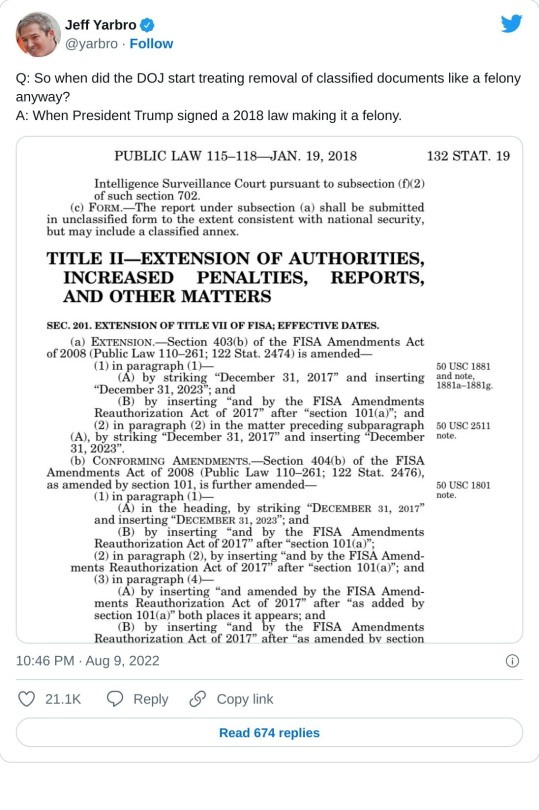
At the time, the classified-information measures attracted little attention, with the focus of news coverage being the renewal of sweeping surveillance powers in the bill.
According to an analysis by Moss and other analysts at the Just Security blog, it is one of a number of laws Trump might have violated if he's found to have mishandled classified material.
There are some doubts about whether the bill Trump signed into law could be used to prosecute him, said Moss, as it's unclear whether it applies to former Presidents.
Trump has vehemently denied any wrongdoing in relation, saying that he had fully cooperated with requests from the National Archives and characterizing the raid as a politically motivated.
His aide, Kash Patel, told Breitbart that Trump declassified the material before leaving office under the President's broad powers for deciding what should remain secret.
Moss said "efforts by Trump to declassify records before he left office" were another key issue that could impact whether the measures could be used to prosecute Trump.
Trump's office did not immediately reply to a request for comment from Insider.
#us politics#news#donald trump#trump administration#mar a lago#fbi#fbi raid#department of justice#ag merrick garland#merrick garland#business insider#yahoo news#Bradley P. Moss#Foreign Intelligence Surveillance Act#fisa#Hillary Clinton#Glenn Kirchner#national archives and records administration#Jeff Yarbro#just security#Kash Patel#breitbart#2018#2022
205 notes
·
View notes
Text
Charlie Kirk
THE BIGGEST FIGHT OF DECEMEBER:
A bipartisan group of senators is quietly trying to renew Section 702 of FISA for 12 more years by slipping it into a "must-pass" defense bill, the National Defense Authorization Act. It is set to expire on Dec 31.
That's right, the same Section 702 that was abused to spy on the Trump Campaign by the same intel agencies that spied on Tucker Carlson while targeting moms, pro-life activists, and MAGA conservatives, want another 12 years of the program with zero consequences.
And your Republican "leadership" is helping to steamroll the 4th Amendment.
God bless the few patriots in DC like Mike Lee, Matt Gaetz, and Andy Biggs who are trying to stop it.
Will Mike Johnson fight back?
16 notes
·
View notes
Text
//The Wire//2130Z April 22, 2024//
//ROUTINE//
//BLUF: TENSIONS RISE IN AFRICA. CONGRESS HIGHLIGHTS D.C. PRIORITIES WITH LATEST BILLS. EARTHQUAKE STRIKES TAIWAN.//
-----BEGIN TEARLINE-----
-International Events-
Niger: The situation remains tense following multiple developments in the region over the past few weeks. Following the coup last year, the status of American involvement in Niger has remained delicate, with the ruling military faction not approving of the American presence at Base 201, as well as in Niamey. A few weeks ago, Niger demanded that the United States leave Niger, and has (in effect) established a no-fly-zone over the base, preventing Americans from receiving logistical aid. Consequently, and after a few Congressmen were contacted by their constituents at the base, what has quietly become a large-scale hostage situation has become public.
Taiwan: This morning several earthquakes again struck the island, the strongest of which had an estimated magnitude of 5.8. Around a dozen separate earthquakes have been reported, which may be aftershocks related to the previous swarm of earthquakes.
-HomeFront-
Washington D.C. – Over the weekend, all of the recent allegedly hotly-contested bills passed in Congress. All of the funding bills passed with zero changes, along with the Tik-Tok ban bill, and the renewal of FISA Section 702 to continue warrantless surveillance of all Americans (except members of Congress). AC: Passing a bill to ban a social media app due to Chinese surveillance, while literally using the color of law to remove the 4th Amendment is not merely ironic, but a deliberate message to the American people. As illegal surveillance is an American pastime at this point, solidifying these actions publicly is merely ‘checking the box’ to improve the efficiency of the already-streamlined political targeting process.
The U.S. Equal Opportunity Employment Commission has sued the Sheetz gas station/convenience store chain, alleging that conducting background checks on employees is racial discrimination as employment is routinely denied to those with a long criminal record. This lawsuit comes less than 24 hours after Biden made a campaign stop at a Sheetz in Pittsburgh, which did not go as well as planned due to a lackluster response to his presence by staff and customers. AC: Though the implications of this lawsuit will potentially result in interpretations not intended by the White House, separately, the message to the American business owner is quite clear, especially those which may become host to a campaign event.
-----END TEARLINE-----
Analyst Comments: The various factions at play in Niger have described the situation on the ground in vastly different ways. The Nigerien government has stated that they will agree to “release” 1,000 American “prisoners” at the base, in exchange for taking control of the airbase itself. From the American perspective, the situation is likely not that severe; the combat power at Base 201 (and at the Embassy in Niamey) is more than enough to decimate the majority of Niger’s military rather quickly. However, both military leaders and diplomats involved in the situation likely want to avoid this situation out of political convenience, which despite an American military advantage being obvious, can be made more militarily complicated by the Nigeriens. As America’s forays in Africa often meet unexpected and politically-impacting ends, it is likely that the U.S. seeks to withdraw from this base quietly.
This situation is compounded by the situation in Djibouti, which has deteriorated severely following the events that led to Yemeni targeting in the Red Sea/HOA region. Djibouti took the side of Yemen, which was rather inconvenient for the exceptionally large American military bases in the region.
Protests against American military presence, along with pressure from local governments has resulted in the United States being placed on the back-foot with regards to two major military footholds in Africa. Though a failure on the proportions of the Fall of Kabul is not likely just yet, the potential for major and devastating military losses (including the loss of many American lives) is possible if tensions continue to sour to the point that the United States is forced out of Africa at the tip of the bayonet.
Analyst: S2A1
//END REPORT//
3 notes
·
View notes
Text
You Can't Make This Stuff Up
Forget Ukraine, FISA, and all that other stuff. This is the actual list of bills that the House of Representatives will take up next week:
H.R. 6192 — Hands Off Our Home Appliances Act
H.R. 7673 — Liberty in Laundry Act
H.R. 7645 — Clothes Dryers Reliability Act
H.R. 7637 — Refrigerator Freedom Act
H.R. 7626 — Affordable Air Conditioning Act
H.R. 7700 — Stop Unaffordable Dishwasher Standards Act
#Republicans#GOP#Republican agenda#the apparent importance of home appliances#Republican priorities#this is not a joke#why don't they do their actual job?
3 notes
·
View notes
Text
oh shit feinstein's dead? we're crab raving tonight gang!
no sympathy for the person who testified about how good a person and a friend harvey milk's murderer was and how he definitely wasn't homophobic
also her voting to extend the patriot act and fisa and similar pro government surveillance bullshit, including sponsoring multiple bills that would make encrypted online communication illegal
16 notes
·
View notes